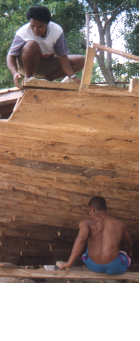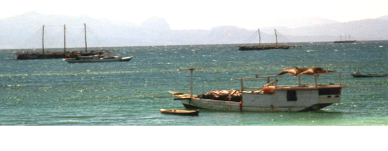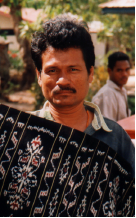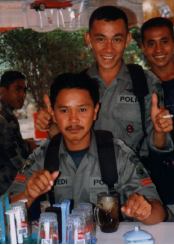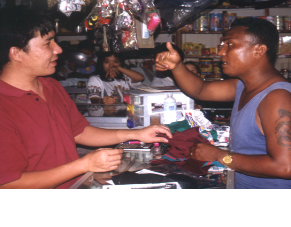The people of Nusa Tenggara Timur work hard to live. Most are subsistence farmers. Some are landless and need to find regular work to live. Towns people also have to find work or start a business to provide for their families. There is no social security provided by the government to assist people who are under-employed or unemployed. Consequently people depend upon resourcefulness and hard work to survive.
A tuak tapper works morning and evening. They climb the tall lontar, slice the rachillae, and drain the sap. This is either for personal use, done for others or for processing and sale. This job is not without danger, there is no workers’ compensation. Falls and broken limbs are regular parts of this job.
A kakilima salesperson works long hours, sometimes walking long distances. People in the villages and streets can recognise which kakilima is coming by its distinctive ring or noise. Some kakilima sell hot or cold food like bakso, bread or cakes. Others sell goods for example household products such as assorted brooms, toys, water, and even plants.
Fishermen can be found throughout the province. They use small or large boats or even just go on foot through the shallows. Big fish and little fish, turtles and lobsters are all caught and eaten or sold at the local market.
These Rotinese women [See the top most photo] are supplementing their income by collecting sand from the beach. The sand will be used in building. It is dug and carried by hand to a waiting truck. Bricks are hand made using a wooden mould, the sand and cement are mixed with limestone rocks to bulk up the brick.
Boat builders work hard producing quality boats. It seems that some are built without an architectural plan. Some villagers just build boats for their own use. Others produce them commercially. The boat here is being produced for the Kupang - Roti route with a selling price of Rp15 million. It will take about three months to complete. Note the wooden nails which hold the ship together.
Weaving is hard work. It requires skill, dexterity and patience. Using the back-strap loom does not make the process easier. The pay is not terrific.
In the major centres where tourists congregate there are also traders who aim directly at the tourist market. After bumping into the weaving seller below, sometimes several times a day, buying something from him is like buying from an old friend! Some sell old coins. Some sell carvings and weavings.
Police Officers are found everywhere in Indonesia. Their distinctive tight brown uniform makes them easy to see. There are different types of police with different styles of dress and duties.
Shopkeepers and market stall sellers work long hours. Shop keepers work from about 8 am till 1 pm. They usually close for the siesta. Then they open again at about 5 pm for the evening’s trade. Often shop assistants work seven days a week. Wages are low and other workers are easy to find. They really have no choice. There are no unions to help them. Fruit and vegetable stall owners start before sunrise. They usually sell their own produce. Try the different types of fruit and vegies when you go there.
Questions and Activities
1. Write a bargaining conversation between a pembeli (buyer) and a penjual (seller), in Indonesian. 2. Describe a day in the life of a tuak tapper. 3. List five jobs you would most like to do, and five jobs you would least like to do. 4. Using an encyclopaedia, find out what is the average annual income for an Indonesian and then find out what it is for those in NTT. 5. Why do people take low paying jobs, such as sand collecting? 6. What role does the police and military have in Indonesian politics?





